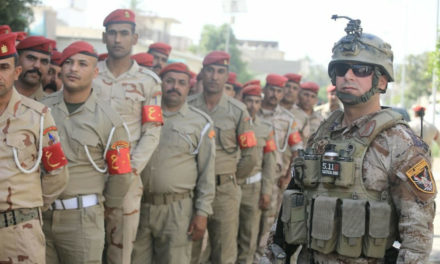(Iraqi delegation visiting China. Photo: Lintao Zhang/AFP)
The Middle East is not influenced by one party anymore because of the simultaneous intertwining of international and regional relations, renewed conflicts between international actors, renewed conflicts between different sects and nationalities, the desire to expand geographically, and economic competition. On the other hand, an observer of the region would find more joint and coordinated action in various fields by regional and international forces, especially in the military as a result of the developments in the region after 2011. They won’t see “a security system capable of transforming military confrontations into political arrangements” that would spare the region from war if it erupts.
The new situation in the Middle East has helped weaken official institutions in some Arab regimes after 2011 which created weak societies and governments that are unable to control their states internally and find a unified vision of the State’s foreign policy, like what happened in Syria, Yemen, Libya, and Iraq after 2014. The rise of Da’ish in the country tipped the political scales in Iraq. Moreover, the security and economic threat to the region over the past ten years has changed the balance of power in the region in a way that affected the entire Middle East.
Economic and Security Causes
The geopolitical vacuum left by the United States in the region has led to a multi-polar confrontation between international and regional players alike. Sometimes they compete. Other times, they cooperate in various fields. This partial withdraw has paved the way for Russia to intervene in the Middle East under an economic cover without playing the role of a security guarantor, focusing only on the energy market, arms sales contracts, and the protection of its geopolitical assets. China on the other hand is trying to achieve its economic objectives to enhance its presence in the region by pursuing long-term investment and economic projects through “persuading Middle Eastern countries to join their ambitious project (The Belt and Road Initiative)” and seeks to stay as far as possible from conflict zones by going to the quiet areas which would provide them with a market for their commercial products and open the way to their industrial and economic companies to sign more industrial and trade agreements with those countries. At the same time, it relies on “the help of responsible and constructive superpowers such as the United States to strengthening stability in the region.”
The European Union has not been far from entering the region, despite the challenges faced internally in uniting its members as a result of Britain’s desire to get out of from under its umbrella, the immigration policy and the refugee problem, and the financial crisis in countries like Greece. The European Union “sought innovative and more independent ways to unite its voice and positions” away from the United States by entering into economic and political agreements with Middle Eastern countries through a foreign policy of the Union as a whole, or working through a foreign policy of each country. Germany has acted, for example, to ensure economic agreements in the energy field by signing agreements with Iraq to develop its electricity sector in April of this year. Germany also sought to access commercial markets through agreements in the health and industrial sectors. The security aspect was not far from the German approach in the region. It worked on signing security advisory agreements in training Iraqi forces in northern Iraq and providing “military advice to the Iraqi military regarding training and logistical support in the fight against terrorism.”
Political Reasons
The changes in the Middle East after 2011 altered the map of alliances and relations in general, which influenced the political balances in the region recently. Despite the high level of tension in the region, the nature of this tension is taking a tendency to show deterrence. The process of demonstrating economic deterrence exposes alliances in the region to embarrassing situations for many countries. For example, the detention of ships in the Persian Gulf by the Islamic Republic of Iran and the detention of an Iranian Tanker by the British Royal Navy in the Gibraltar area, and the call by the British Foreign Office to the European Union for a plan to protect shipping in the “Gulf region by forming a European-led force working to ensure the safe passage of crews and tankers in this vital region” have imposed a new reality for alliances in the region in general and on the members of these alliances in particular. It is considered a security threat to neighbouring countries, and in many cases, this threat usually causes disturbances to the status quo which leads to an increase in the likelihood of conflict. If there is no accurate calculation of such threats, war would erupt and could cause losses for all sides in the region. The seizure of ships in the Persian Gulf, the striking of Saudi Aramco’s oil installations, the United States withdrawal from northern Syria, have affected the new balances and imposed a new geopolitical reality. Everyone realized the necessity to sit at the negotiating table and avoid chaos.
Given the volatile situation in the region, “regional powers, which usually play the role of external actors in ensuring balance in the region, are either looking to diversify their security relations and achieve new balances or try to play a more ambitious proactive role by taking advantage of the.” The United States-China rivalry in the Middle East has changed the rules of the game in the region. The United States is moving toward Northeast Asia and working to make these countries the arena of an indirect conflict with China. This move has been interpreted by observers as a “burden-sharing move”, but at the same time, the United States views this move as a way that will push China to preserve its economic assets in that region. The result will be reducing Chinese influence in other regions of North Africa and the Middle East.
Observers believe that the American approaches to contain Iran led to a remarkable trend “because any abandonment of any geopolitical space will lead to the reoccupation by other players and rival forces“. The United States withdrawal from northeast Syria is seen by many as completely contradictory to the plan of containing Iran, as announced by the President. But at the same time, some Gulf states have already realized the need to revise their positions in the Gulf and the Arab world, which led them to take more flexible political positions. “On 28 December last year, Bahrain and the United Arab Emirates stated that they would reopen their embassies in Damascus.” This came after Oman’s move to reopen its embassy in Syria. Saudi Arabia and Kuwait said they will work to restore the membership of Syria in the Arab League.
Conclusion
The nature of the United States-China competition in the region and the change in balances and alliances in the future will lead to imposing a new reality that requires everyone to re-examine their regional, international, and even local positions and orientations. The Gulf and Arab countries, in general, need to recognize the extent of this change and work internally, provide more opportunities and political freedoms, create a neutral public opinion, open the door for broad political participation, and offer a serious and concrete economic reform. Observers notice that the vacuum left by the Gulf states leaning towards Asia and North Africa has forced the region to become a sphere of influence to other regional powers at the moment, and this will help complicate the political landscape in the region and make the center of balance and influence unilateral. It has become difficult to avoid dragging the region to a losing war because shared interests and influence in the Middle East are bound to regional and international players involving the United States, China, Russia, Turkey, Iran, and the Gulf states.

Aymen Al-Faisal
Aymen Al-Faisal is a researcher and academic, with a special interest in Gulf political affairs; based in Baghdad.










